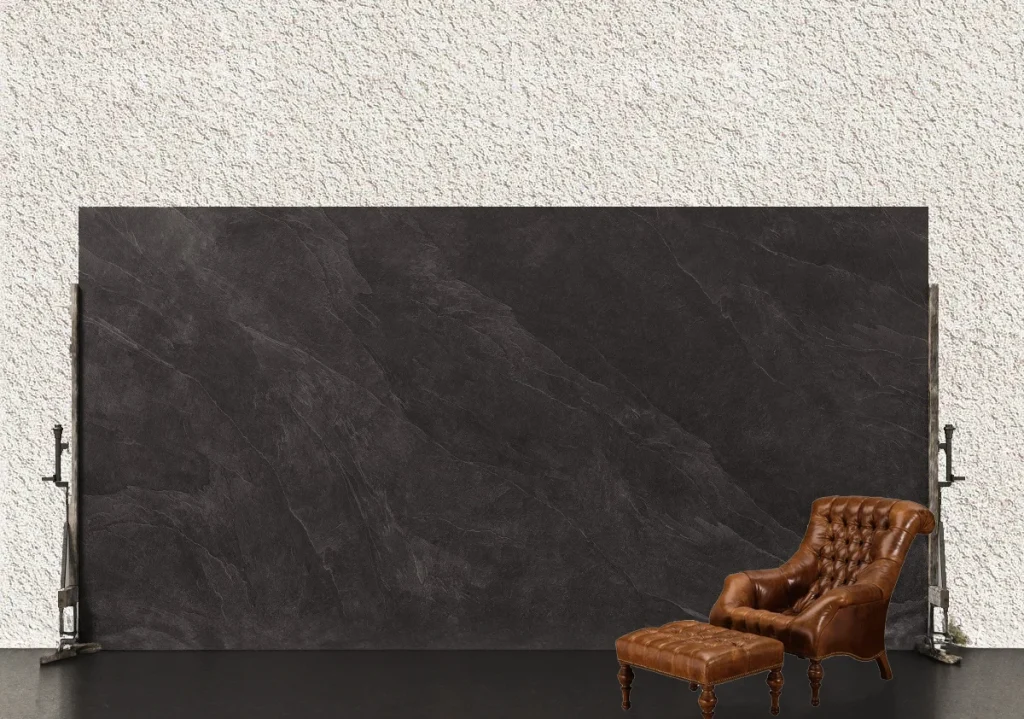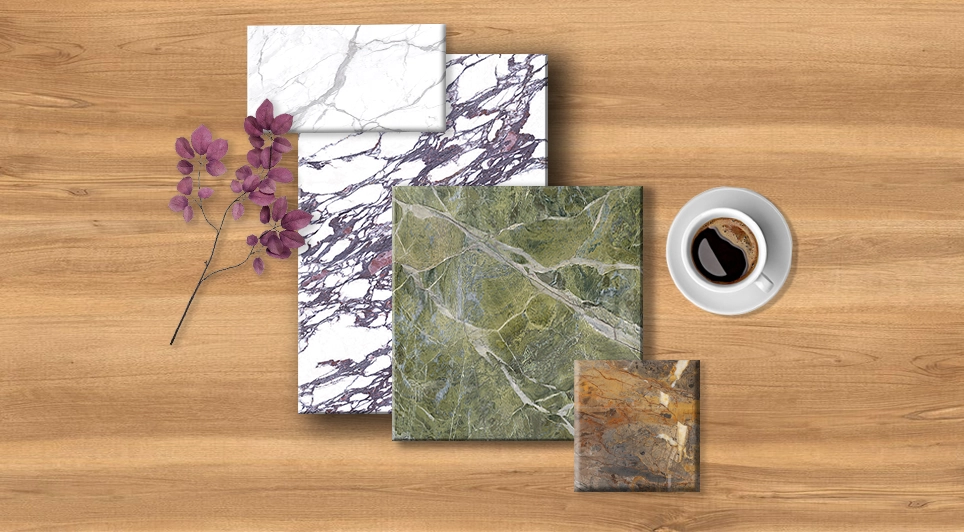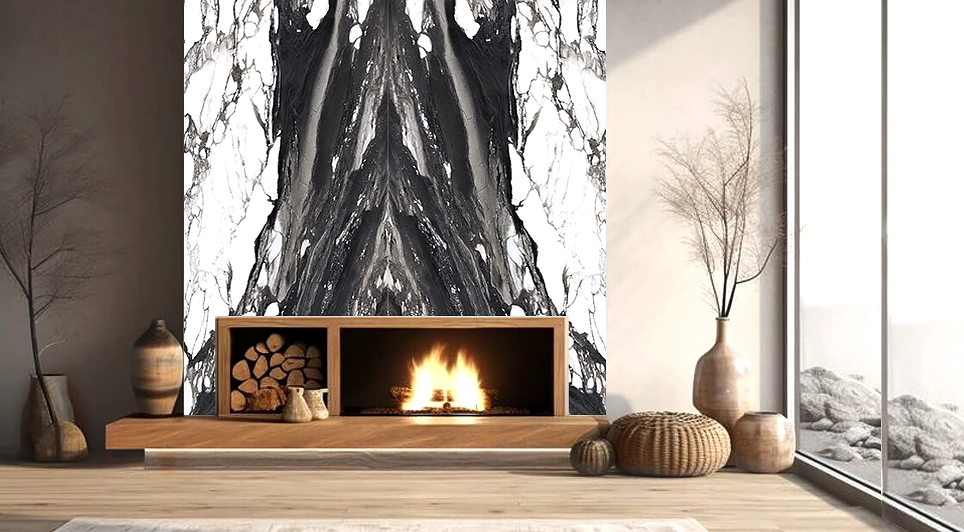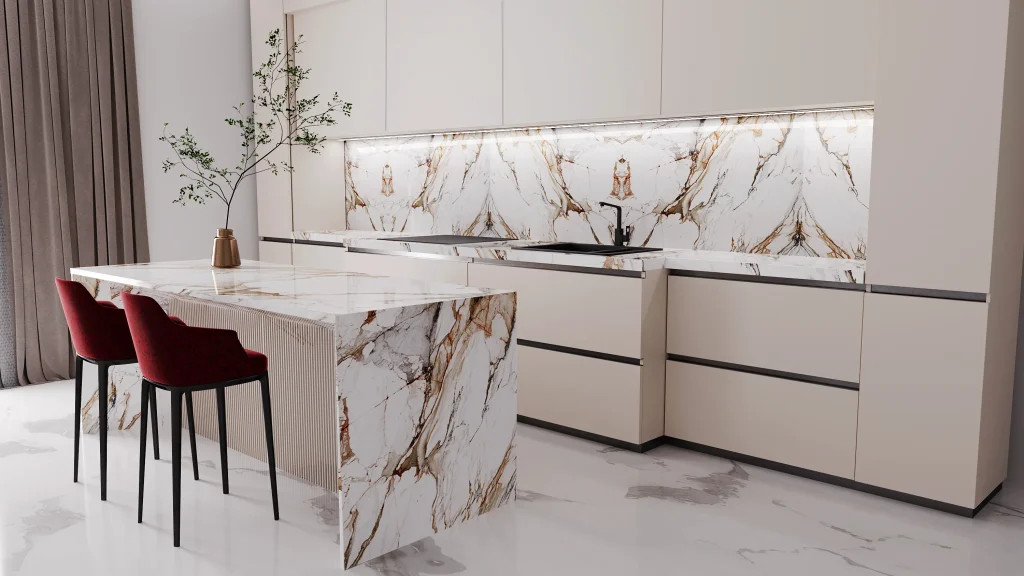Engineered surfaces like porcelain are giving tough competition to natural stone surfaces for flooring and countertops, thanks to their incomparable strength and minimal upkeep requirements.
Porcelain slabs made their debut in the countertop industry around 2010 and since then it has been a preferred choice for many homeowners.
If you are considering porcelain surfaces for your next kitchen makeover, stay tuned to our blog as we explore different facets of this innovative material including its pros and cons, and how you can incorporate it in your interiors.
What Are Porcelain Slabs?
Porcelain slabs are a man-made surfacing material, designed to imitate the look of high-end marble. They are composed of a blend of Kaolinite (similar to clay), feldspar, silica, and various minerals.
This mixture is molded, glazed, and fired in a kiln at temperatures ranging from 1200 to 1400 degrees Celsius, resulting in a robust and resilient surface that can withstand daily wear and tear.

What Is So Special about Porcelain Surfaces?
Porcelain surfaces are attractive due to their elegant appearance and superior strength. What makes them even more unique is how closely they resemble natural stones, making them difficult to distinguish at first glance.
While porcelain evokes the same beauty and charm as luxury marble surfaces, it is less expensive, making it more accessible to consumers.
What Are the Pros and Cons of Porcelain Countertop Slabs?
Since its inception, porcelain has emerged as a promising countertop material. However, like any other stone, it comes with its own share of advantages and disadvantages. Let’s have a look at it.
PROS
Superior Aesthetics
As previously said, the colors and patterns of porcelain are primarily inspired by marbles, and it is unquestionably the most aesthetically closest match to natural stones.
Crafted with advanced machinery, each porcelain slab appears incredibly refined with an even distribution of colors and patterns throughout its surface, instilling a sense of balance and harmony in a place.
At Ultra Stones, we house a diverse palette of porcelain slabs and tiles for you to elevate your interiors with its remarkable beauty.

Exceptional Durability
One of the primary advantages of porcelain surfaces is their exceptional strength and durability.
Porcelain countertops are non-porous and strong, making them resistant to scratches, stains, and even etches from household acidic substances such as lemon juice, wine, or vinegar. Porcelain slabs are an excellent choice for busy kitchens.
Heat and Chemical Resistant
What makes porcelain surfaces a perfect material for countertops is their excellent resistance against heat and chemical substances.
When you place a hot pot or pan on top of porcelain, it will not be damaged. In addition, being made from clay-like material, it does not react to household chemicals like bleaching or cleaning agents. Yet, we would recommend against using any harsh chemicals for cleaning your surfaces.
Suitable for Outdoors: Porcelain is suitable for outdoor kitchen countertops since it is not sensitive to UV light. Furthermore, unlike natural stones, which wear over time, this engineered stone is resistant to rain, snow, and other environmental stresses.
Easy to Maintain
As we know already, porcelain is a dense and non-porous material, which means it does not get stained or etched easily. As a result, porcelain countertops are very easy to maintain. You can clean the surface with mild soap and water to keep it neat and shining.
Affordable
Porcelain surfaces are more affordable compared to premium high-end marbles while evoking the same sense of elegance. This is why porcelain is widely used to decorate commercial spaces.
CONS
Prone to Chipping
Porcelain slabs are prone to chipping because of their dense structure. It is important to be mindful of the edges of your countertops as they can easily chip from heavy impact.
Time-consuming Fabrication Process
Fabrication of porcelain is a time-consuming process. Since porcelain is compact in structure, it contains surface tension. Fabricators must conduct perimeter cuts to remove surface tension and prepare the material for application.
Moreover, clients prefer 45 degree mitered edge countertops for a seamless appearance, and fabricators spend a lot of time performing 45 degree miter cuts. These cuts should only be made with factory-recommended blades to avoid material damage.
How Can You Incorporate Porcelain in Your Interior Design?
Porcelain’s exceptional durability provides for greater versatility in its applications. It is suitable for both indoor and outdoor applications. You can use it for both your interiors and exteriors.
Here are some of the best applications of porcelain surfaces
- Flooring
- Countertops
- Backsplashes
- Shower walls
- Fireplace surrounds
- Patios
- Pool surrounds
- Tabletops
- Accent features
- Facades

You can also create some amazing bookmatch statements with our exclusive assortment of Kaolin products. Colors like Arabescato Venato, Irish Green, Nero Antique, Calacatta Paonazzo, and Statuario White are our favorites for bookmatching as their extraordinary visuals can elevate any space.
If you want to explore more porcelain surfaces in New York and Pennsylvania, feel free to visit us https://ultrastones.com.


